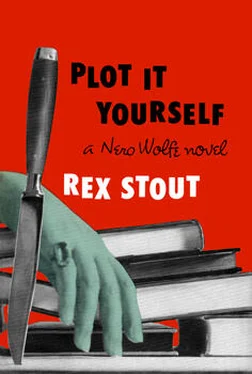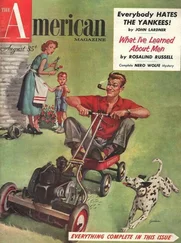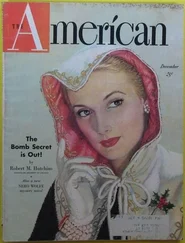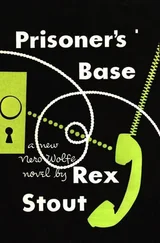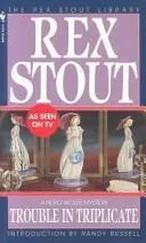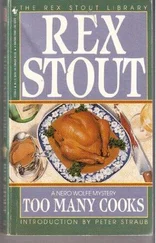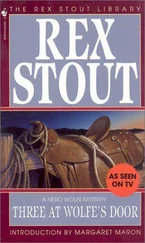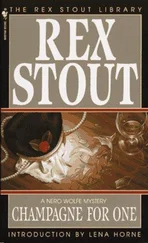“In my opinion,” Gerald Knapp said, “we should decide that now. I fully approve of Mr. Oshin’s suggestion and move that we adopt it. If Mr. Echols consents it shouldn’t be necessary to have another meeting. Mr. Wolfe could proceed at once to have the necessary papers drawn and make the offer to Simon Jacobs.”
“Second the motion,” Oshin said.
“Further discussion?” Harvey asked. “If not, all in favor raise your hands. It seems to be unanimous. Miss Wynn, when can you let me know whether you will match Mr. Oshin’s ten thousand? Today?”
“Oh, yes,” she assured him. “Certainly by five o’clock.”
“Good. If I’m not at home call Miss Ballard at the NAAD. Now, Mr. Wolfe, I hope this has changed your mind. I hope you’ll agree that we’re making some progress, and of course you and Mr. Goodwin made it possible. Have you any comment?”
“Yes,” Wolfe said. “I am a detective, not a conveyor of bait. However, since Mr. Goodwin named Mr. Jacobs as the prospective receiver, he and I have a responsibility. If the preparations are satisfactory, we will act.”
At twenty minutes past four that afternoon Amy Wynn told me, not on the phone, in person, that she would match Oshin’s ten grand.
The development started shortly after three o’clock with a phone call from Reuben Imhof. Wolfe and I were in the office, having lunched together in the dining room in a slightly improved atmosphere. He was at his desk dictating letters, and I was at mine taking them, when the phone rang and I answered it.
“Nero Wolfe’s office, Archie Goodwin speaking.”
“This is Reuben Imhof. I understand that Wolfe never leaves his house on business.”
“Correct. He doesn’t.”
“All right, you, then. Come up here quick. My office, Victory Press.”
“I’m pretty busy. Say in an hour?”
“No. Now. Nothing I can tell you on the phone. Now! ”
“Okay. Coming. Keep your shirt on.” I hung up and told Wolfe, “Imhof. Something is biting him, he wouldn’t say what, and he wants me quick. Our responsibility?”
Wolfe grunted. “Confound these interruptions.” We were in the middle of a letter to Lewis Hewitt, describing the results of a cross of C. gaskelliana alba with C. mossiae wageneri. “Very well. Go.”
I did so. At that time of day taxis are apt to crawl slightly faster on Eighth Avenue than on Tenth, so I headed east. We finally made it to 52nd and Sixth Avenue, and when we turned right and I saw that the whole block was choked I paid the hackie and quit him. The Victory Press address, on Madison in the Fifties, was one of the new concrete and glass boxes, with a green marble lobby and four banks of elevators. As I entered the suite on the thirty-second floor I half expected to find the place in an uproar, from the way Imhof had sounded on the phone, but all was serene. The two people on chairs in the reception room, one of them with a bulging briefcase on his lap, merely looked patient, and the bright-eyed receptionist at the desk merely lifted her brows as I approached. However, when I told her my name she said Mr. Imhof was expecting me and used the phone, and in a moment an attractive young woman entered through an arch and asked me to follow her, please; and being, as I have said, a trained observer, naturally I noticed that she had restless hips.
Reuben Imhof’s room was an ideal setting for discussing the terms of a book contract with a member of the NAAD. Surely an author wouldn’t be fussy about little things with a man who had a desk like that, and such fine comfortable chairs, and four windows on two sides, and genuine oil paintings on the walls, and real old Persian rugs. Having taken that in with a quick glance around, I crossed to the desk. Imhof, behind it, kept his seat and his hands. From his look he was in no mood to shake hands with William Shakespeare or Mark Twain if one of them had suddenly entered. He didn’t greet me at all. Instead, he spoke to the young woman who had ushered me in. “Don’t go, Judith. Sit down. Look at this, Goodwin.”
I didn’t hop. It may be true that, as a friend once told me, I have no more social grace than a conceited tiger, but Amy Wynn, being a member of the committee, was one-sixth of our client and not to be ignored. So before looking at the object Imhof had on his desk I turned to the chair where Amy Wynn was sitting and told her good afternoon. She nodded, just barely. Then I looked at the object.
It was some sheets of paper, 8½; by 11. The one on top was headed “Opportunity Knocks,” and below that, “by Alice Porter.” In the upper right-hand corner was a date, June 3, 1957. The text that followed was double-spaced. I lifted the edges to the last sheet: twenty-seven pages. There were no creases from folding.
“By God,” Imhof said.
“I doubt it,” I said. “I doubt if He had a hand in it. Probably not by Alice Porter, either. Where was it?”
“In a cabinet in the filing room down the hall. In a folder marked ‘Amy Wynn.’ ”
“Who found it?”
“Miss Frey, my secretary.” He aimed a thumb at the attractive young woman. “Miss Judith Frey.”
“When?”
“About ten minutes before I phoned you. Miss Wynn was here with me. We were discussing the contents of a letter I wrote her last week, and I sent for Miss Frey and asked her to bring the carbon. She brought the whole folder, because, she said, of something that was in it. The ‘something’ was that. She says it wasn’t in the folder last Wednesday, five days ago, the last time she had occasion to go to it. I want to ask you something. Do you remember that this morning Mortimer Oshin said Miss Wynn was in the same position with Alice Porter as he was with Kenneth Rennert, and I said it wasn’t the same because the story hadn’t been produced, and he said, ‘It will be’? Not ‘It may be,’ ‘It will be.’ Remember that?”
“Nuts.” I moved a chair around and sat. “People say things. How much have you handled it?”
“Not much. I glanced through it. So did Miss Wynn.”
“It probably doesn’t matter. Whoever put it there has probably heard of fingerprints. Who has access to that room?”
“Everybody here.”
“How many?”
“In this department, executive and editorial, thirty-two. Altogether, more than a hundred, but people in other departments never go to that room.”
“But they could?”
“Yes.”
“Is there always somebody in that room? Someone stationed there?”
“No one is stationed there, but people are always going and coming.”
“Then an outsider could just walk in?”
“I suppose he could.” Imhof leaned forward. “Look, Goodwin. I got you here immediately. This is hot. Nero Wolfe is supposed to be the best there is, or you and he together are. We want you to get this sonofabitch, and get him quick. Miss Wynn wants you to, and so do I.”
“Him or her.”
“Okay. But quick. By God!” He hit the desk with his fist. “Planting it here in this office! What are you going to do? What do you want me to do?”
I crossed my legs. “It’s a little complicated. Mr. Wolfe already has a client, the Joint Committee on Plagiarism, of which you and Miss Wynn are members. There could be a conflict of interest. For instance, considering this case alone, independently, possibly the best course would be to forget that this thing was found. Burn it or let me stash it. But the committee wouldn’t like that because it may be helpful in stopping this plagiarism racket for good, which is what they want. How many people know this thing has been found?”
“Three. Miss Wynn, Miss Frey, and I. And you. Four.”
“How long has Miss Frey been with you?”
Читать дальше
